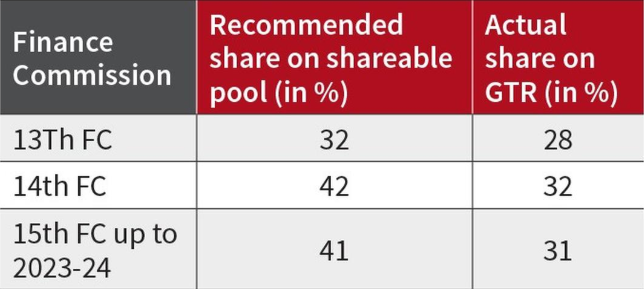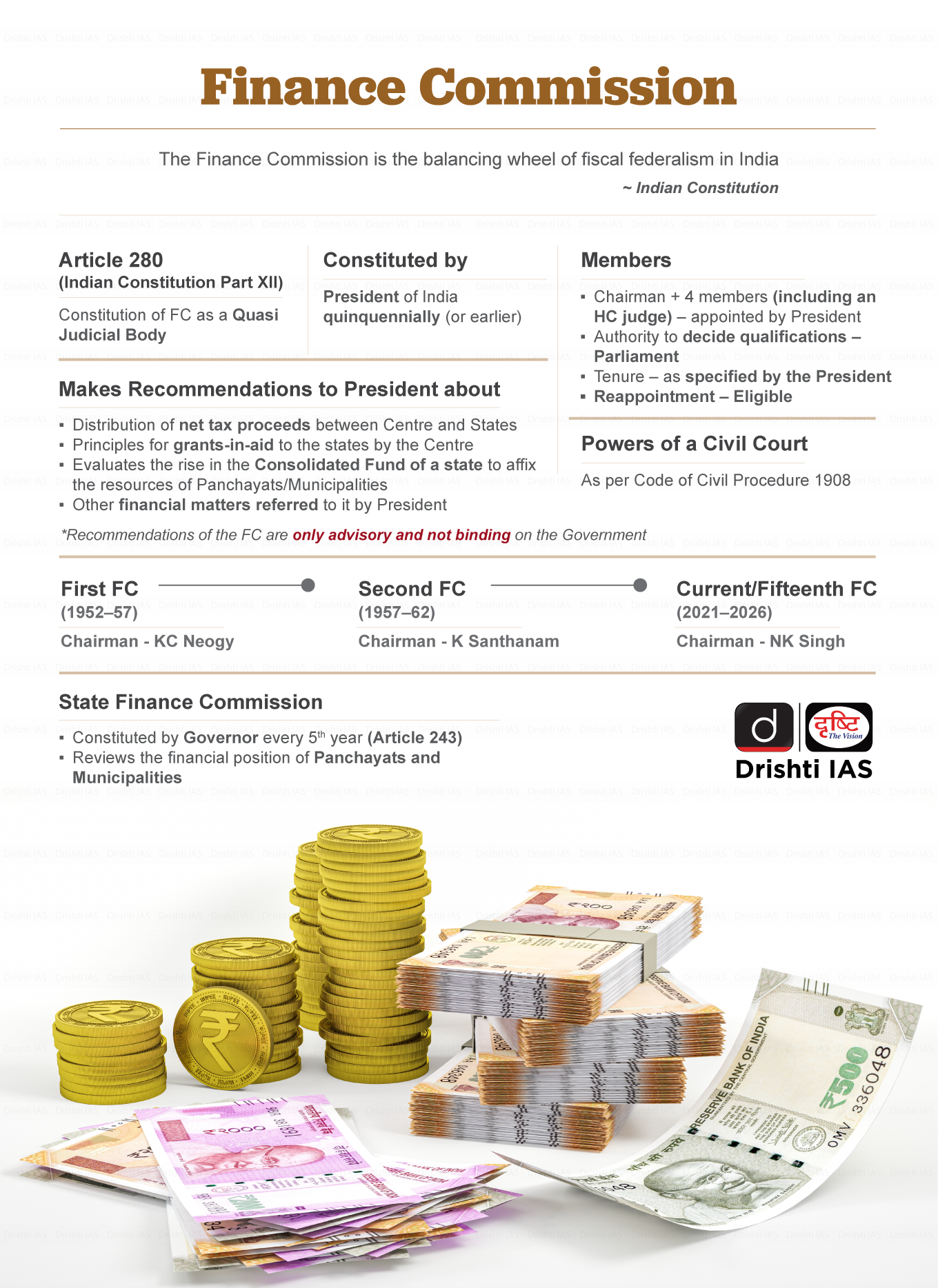Indian Polity
Restoring Fiscal Power for the States
- 27 Oct 2025
- 9 min read
For Prelims: Goods and Services Tax (GST), GST Compensation Cess, Article 269A, GST Council, Article 275, Finance Commission, Seventh Schedule, Cesses and Surcharges, Centrally Sponsored Schemes.
For Mains: Key Challenges to Fiscal Federalism in India, especially after GST reforms, and Strategies to Address Them through Cooperative Federalism.
Why in News?
The Goods and Services Tax (GST) regime enters a new phase with restructured tax slabs and the abolition of the GST compensation cess, expected to transfer Rs 2 lakh crore in benefits to consumers and boost demand.
- However, several States have raised concerns over revenue losses and fiscal centralization, seeking a review of the tax-sharing framework to preserve cooperative federalism.
What are the Key Challenges in Centre-State Fiscal Relations?
- End of GST Compensation Cess: GST compensation cess, introduced to protect States from revenue losses (2017–22) and extended during the pandemic, is now abolished, which states argue disproportionately impacts those with low manufacturing capacity.
- Erosion of Fiscal Autonomy: The GST introduction shifted taxation power from state legislatures to the GST Council, where the Centre dominates, reducing states’ tax revenue autonomy.
- Skewed Revenue Sharing: Although the 14th Finance Commission raised the devolution share to 42% (later adjusted to 41%), actual transfers have declined in percentage terms of Gross Tax Revenue (GTR).
- Cess and Surcharge Mechanism: These are outside the divisible pool under Article 270. Cesses and surcharges constituted Rs 4.23 lakh crores in 2025–26, reducing the effective devolution to States.
- Heavy Dependency on Central Transfers: States rely on central transfers for about 44% of revenue, with some like Bihar up to 72%, weakening fiscal autonomy and causing liquidity issues.
- Vertical Fiscal Imbalance: A structural mismatch exists as resource-raising powers are centralized while expenditure responsibilities are decentralized.
- States bear 52% of expenditure but collect only 33% of tax revenue, creating a fiscal gap.
- Political and Administrative Frictions: The central transfer system, including Finance Commission grants and Centrally Sponsored Schemes (CSS), is perceived as lacking fairness and transparency, creating fears of political vendetta.
How does the Indian Constitution Regulate Central-State Fiscal Relations?
- Part XII (Articles 264–300A): It contains financial provisions including those related to taxation, definition of various Funds, the right to hold property, and borrowing by Union and State governments.
- Under Article 275, the central government can transfer funds to states for specific schemes or purposes to provide necessary financial support.
- Article 269A (GST): Article 269A states that GST on inter-state trade will be levied and collected by the central government and shared between the Union and States as determined by Parliament based on GST Council recommendations.
- Division of Taxation Powers: The Seventh Schedule of the Constitution defines taxation powers:
- Union List: Includes customs, income tax (except on agricultural income), excise on goods, corporate tax.
- State List: Includes taxes on agricultural income, land, buildings, and excise on alcohol.
- Concurrent List: Both can tax items in the Concurrent List.
- Finance Commission (Article 280): The Finance Commission advises the President on:
- Distribution of tax proceeds between Centre and states, and among states.
- Principles for grants-in-aid to states (Article 275).
- Measures to augment state funds for Panchayats and Municipalities.
- Other financial matters referred by the President.
What Measures can be Taken to Restore the Fiscal Autonomy of States?
- Reviewing Finance Commission Mandates: Ensure consistent application of devolution criteria and greater transparency in weights used.
- Consider performance-based incentives beyond income distance and population.
- Sharing Personal Income Tax (IT) Base: Adopt 50:50 sharing of the Personal Income Tax base between the Centre and State to help high tax base states benefit from economic growth and reduce central transfer dependence.
- Surcharge on Central Taxes: Allow states to levy a surcharge on central income tax to boost revenue-raising capacity and provide immediate fiscal relief.
- Strengthening Institutional Mechanism: Bring petroleum, real estate, and alcohol under the GST regime for a unified market and higher revenue.
- Strengthen the Inter-State Council under Article 263 for ongoing fiscal consultation and grievance redressal.
- Adopt International Models: India can consider Canada’s fiscal federalism model, where the federal government collects 46% of taxes and spends 40%, while sub-national governments collect 54% and spend 60%, providing greater financial autonomy and flexibility to states.
Conclusion
India's GST reforms boost growth but underscore the need to rebalance fiscal federalism. Restoring state autonomy requires increasing own-source revenues, rationalizing central schemes, and addressing vertical resource imbalances to uphold cooperative federalism.
|
Drishti Mains Question Q. Discuss the constitutional provisions governing financial relations between the Centre and the States. What measures can be adopted to enhance the fiscal autonomy of States in the spirit of cooperative federalism? |
Frequently Asked Questions (FAQs)
1. Which part of the Indian Constitution deals with Centre–State financial relations?
Part XII (Articles 264–300A) deals with financial matters, including taxation powers, grants, and borrowing authority between the Centre and States.
2. Which constitutional article establishes the mechanism for sharing GST revenues between the Centre and States?
Article 269A of the Indian Constitution provides that GST on inter-state trade is levied and collected by the Centre and shared based on the recommendations of the GST Council.
3. What constitutional body is responsible for recommending the distribution of tax proceeds between the Union and the States?
The Finance Commission, constituted under Article 280 of the Constitution, is mandated to recommend the distribution of tax proceeds.
UPSC Civil Services Examination, Previous Year Question (PYQ)
Prelims
Q. Which one of the following in Indian polity is an essential feature that indicates that it is federal in character? (2021)
(a) The independence of judiciary is safeguarded.
(b) The Union Legislature has elected representatives from constituent units.
(c) The Union Cabinet can have elected representatives from regional parties.
(d) The Fundamental Rights are enforceable by Courts of Law.
Ans: (a)
Mains
Q. How have the recommendations of the 14th Finance Commission of India enabled the States to improve their fiscal position? (2021)
Q. The concept of cooperative federalism has been increasingly emphasized in recent years. Highlight the drawbacks in the existing structure and the extent to which cooperative federalism would answer the shortcomings. (2015)








